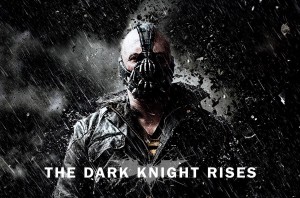 So on Sunday morning a friend and I went to see the final film in director Christopher Nolan’s Batman saga. I came away impressed and ready to add the film to my collection. (Seriously had then been a blu-ray for sale in the lobby it would have come home with me.)
So on Sunday morning a friend and I went to see the final film in director Christopher Nolan’s Batman saga. I came away impressed and ready to add the film to my collection. (Seriously had then been a blu-ray for sale in the lobby it would have come home with me.)
There has been a lot of talk recently about the politics of this movie. A great deal of it surrounding the homonym Bane and Bain, but really that is just the nattering of negligible minds. There are interesting political dimensions to the plot and story of The Dark Knight Rises, far beyond simple coincidence over names.
There are some light spoilers ahead, so if that bothers you, go see the movie then come back.
In the movie there is a lengthy period of time when anarchy rules in Gotham City. The villain Bane, has neutralized the police forces, and dissuaded the national government form interfering, leaving the citizens of Gotham to liberate their city in true French Revolution style. Seriously, Nolan doesn’t even try to hide the metaphor, starting the events with the storming of a prison.
Naturally this doesn’t go very well. There are kangaroo courts, the formerly wealthy are tried for their crimes and subject to lethal punishments. The revolution even quickly turns to eating its own. Gotham becomes a terrible hellhole, one ripe for rescue by the Batman and her stalwart friends.
After the film my friend commented that the anarchy in Gotham showed the failures of collectivism, and he is not alone in that assessment. The writer principally responsible for the creation of the character Bane in the Bat Canon feels that Bane and his crowd are more closely akin to the Occupy Wall Street Movement than to Romney’s old venture capital firm. I think this is a fair assessment, but the film is far from simple.
Certainly given the chance to pull down and destroy the wealthy, the citizens of Gotham waste no time in getting to work, and immediately after the film I was referring to this as an example of the movies cynicism towards humanity, but now I am not so sure.
Is it possible that the reason the citizen turned so violent so easy is because of the economic inequality? Is one of the points of the film that if you lose too much of your middle class, then violence and death for everyone in a possible result?
The Russian Revolution – something else that gets nodded towards in the movie – happened in a society with terrible economic inequality. Starving masses, I have long maintained, are essential to popular revolutions. You cannot have starving masses without vast and crippling economic inequality.
I think there is also a message in the movie, or at least there is a message you can take from the movie regardless if it was planted their intentionally, is that what is good for the bank accounts of the wealthy is not always good for society, and ultimately not even the wealthy.
As to the failures of collectivism, I will also note that to me the saving of the city was a collective act. It was not one man, one individual who rescues Gotham it was many many people, some remember for their greatness, some forgotten and dead in the streets. So the film also celebrates the victory of the collective and the willingness to accept that there are goods beyond the individual.
